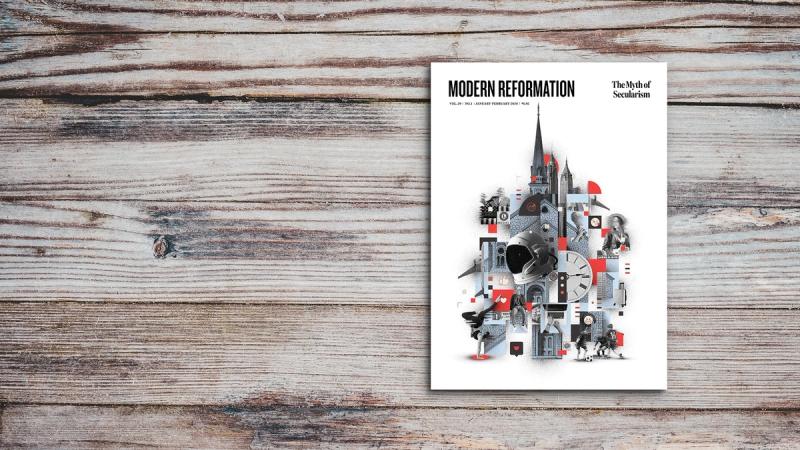White Horse Inn radio cohost Michael Horton interviewed Dr. Uwe Siemon-Netto, former religion editor of United Press International, international columnist, and Lutheran lay theologian. He is also a Senior Distinguished Fellow of 1517 The Legacy Project.
WHI: Please tell us the story about how you came back to your Lutheran upbringing.
US-N: This was in the mid-1970s in the aftermath of the 1968 revolution in Germany and all around Europe. I took over as managing editor of a daily newspaper in Hamburg, where my staff consisted of three factions: old-fashioned social democrats; guys who had no opinion; and rabid, extreme leftists—who were, of course, the noisy ones. They always wanted to argue with me, and they always wanted to have headlines that were ideologically from their perspective but that wouldn’t sell a single newspaper to any sane reader.
At one point, I had enough and said, “Look, you are all Marxists, and I am not. But I can tell you that a newspaper can be led only from the top on down like a pyramid. Your problem is that I am on top and you’re down.” That ended the discussion.
In those days, I was never an atheist or even an agnostic, but I just thought I could keep God at a safe distance. I thought he could look away while I was having fun. So one day, after a violent debate I had with these guys, the most rabid feminist lesbian Trotskyite member of my staff said to me, “We all realize, of course, that you are by far the best expert on Marx here in the newsroom.” I said, “Yes.” She said, “But you’re not a Marxist.” I said, “No.” She said, “If Marx does not drive you, who does?” And here I heard myself say, “Well, Jesus Christ.” The thought hadn’t crossed my mind for many years. I was far too busy covering wars and doing all sorts of things. She went back quietly to her desk, and I went into my office and thought, what did I just say? If I said it, then it must be true.
I then rushed back home to the pastor of the congregation I would have belonged to had I been a member of the church, and I said, “Listen, I want to join the church again. Can I come by this afternoon before I have to go back to this editorial conference and fight with these left-wingers again?” He said, “No, no, stay where you are. Everyone else is leaving the church, and you’re the only one I can sign up, so this is how it goes.”
WHI: That’s wild. Your PhD dissertation under Peter Berger, whom we recently interviewed, was titled “The Luther Cliche,” published in Germany and then its English language edition.
US-N: No, I wrote it in English; then in order to let the Germans have some fun as well, I translated it into German. But the book in English is called The Fabricated Luther: Refuting Nazi Connections and Other Modern Myths. The thesis is that Luther was Hitler’s progenitor, that the Lutheran doctrine of the two kingdoms had actually led Germans to become a bunch of wimps and weirdos who succumbed so easily to Hitler. This is theologically absolutely false, but in order to show this, you have to show the Lutheran doctrine of the two kingdoms: the kingdom to the left, which is where God reigns in a hidden way through his creation, through us, his masks; and, of course, the kingdom to the right where God has revealed himself in Christ.
So you have this constant tension in Lutheran theology between the two realities of a Christian who operates in two directions: vertically to God and horizontally to his fellow man. That is distinctly Lutheran. The paradoxical relationship and interplay between Christ and culture has always been turned in a primitive fashion on its head by many of Luther’s antagonists, actually all the way back to the sixteenth century and then specifically during World War II, blaming Luther for everything. Hitler was an ex-Catholic, and most of the Nazi leadership was ex-Catholic. Three quarters of the concentration camps were Austrians and by definition ex-Catholic—not that I want to blame the poor Catholics for the Nazis. The Nazis were anti-Christian. They were, by and large, either atheist or had a totally different theology from ours.
I showed in my dissertation how, in fact, Lutheran thinking and Lutheran law-and-gospel thinking actually made the leaders of the German resistance against the Nazis, led by the mayor of my hometown, Carl Goerdeler. In my book, I showed that Lutheran doctrine of the two kingdoms, and their clear distinction between God’s twofold reign as the hidden God and the revealed God, had a massive influence on this resistance movement. For example, Luther very clearly said that when the horseman lost his mind, he must be removed from the driver’s seat. Then Luther added, but only after you have found another way or have found a replacement for him. In other words, you can’t let the coach run wild without a coachman. This is precisely how the resistance in Germany, especially Carl Goerdeler, planned their actions. Unfortunately, they did not succeed.
WHI: You’ve lectured on apocalypticism—or enthusiasm, as our forbearers would have called it —that enflames a lot of the revolutionary and even repressive regimes around the world. When you compare it with the age of the Reformers and the radical Anabaptists trying to take over the City of Münster for example, how important is eschatology?
US-N: Thomas Muntzer was Luther’s chief antagonist, and he called Luther a monkey because he followed Scripture so cautiously. Muntzer thought you should be influenced by the Holy Spirit. Now the problem is, of course, that you very often confuse the spirit of the time with the Holy Spirit, and then you get your knickers into a fierce twist. You don’t know what is next, and you think the Holy Spirit ordered the destruction of the Jews or the construction of the Berlin Wall, simply because it happened to be the spirit of the time.
The big fight between Luther and Muntzer was precisely over this issue: whether man is called to give God a hand in creating paradise on earth. It’s been going on now since the sixteenth century when Muntzer thought he could create a paradise for revolutionary peasants. Friedrich Engels referred in his writings directly to Thomas Muntzer, as did Alfred Rosenberg, who was the chief ideologue of the Nazi party. They’re not the only ones, but they referred to Muntzer. What was it that the Communists tried to create? A personal and private little paradise for workers and peasants.
WHI: Does my memory serve me correctly that when I was in East Germany before the Berlin Wall came down, Muntzer’s image was on the currency?
US-N: Yes, Muntzer was on the money, and schools were named after him. He was one theologian who had high marks in Communism.
WHI: As you look around today, do you see a kind of religious enthusiasm or apocalypticism, or whatever you want to call it, as sort of Muntzer-like, even among non-Christian leaders?
US-N: Oh absolutely. Take all the “isms” that rule our day. All those are Muntzer-like. On the Left are radical feminism (I’m not talking about the demand of women to be paid equally, which of course is another issue altogether) and homosexuality as an ideology (not as another form of sin like so many others). On the Right, you have radical evangelical groups that think the world should be governed according to the gospel. That’s not possible. We are called to serve God (the horizontal relationship with God) by serving our fellow man, and we are given the law. We are given the law, and we are given practical reason—which is under sin but nonetheless helps us find our way around this world. It is a finite world, but it still has to be managed; as opposed to the infinite kingdom of Christ, where we are forgiven sinners and which illumines our reason if we are Christians.
Nonetheless, if you now talk about the point of the gospel the whole time you’re discussing politics, I think this is enthusiasm. You cannot argue against abortion with an atheist based on Scripture, because Scripture doesn’t mean anything to an atheist or an agnostic. But you can argue against abortion based on natural law, which is the law written upon every man’s heart. Therefore, you can say that no civilized society throughout the ages (pre-Christian or whatever) would have found it acceptable to murder the most innocent—namely, the children in their mothers’ womb. In the final analysis, these evangelicals and I want the same thing. I want this heinous genocide, which has killed more than fifty million since Roe v. Wade, to end right here and now. But don’t argue this based on something the majority of people no longer know.
WHI: Many evangelical Protestant Christians in America want the church to be a powerful force for transforming culture. You have covered, and still cover, a lot of big stories and headlines around the world, and you’ve seen quite a few transformative movements. Your work obviously straddles both kingdoms, so how do you as a Christian draw from your own theological categories in order to negotiate these and hope for transformation, but not to see the church as the source of that?
US-N: Christ as the transformer of culture is a puritan and a social gospel type of theology to which I do not subscribe. As I said, I believe in the Lutheran concept of Christ and culture being in paradox. I’m proposing to teach a journalism course. In this course, I hope to impart to these students (most of whom will probably be Christians) the idea that they are not called to preach the gospel from the pulpit or handle the silverware at the altar. That’s not what journalists do. We all have our calling, and according to Scripture, we are called to serve our neighbors. This is what Luther stressed over and over again. This comes right out of the Sermon on the Mount and Ephesians. We are called to serve our neighbors. Dietrich Bonhoeffer, one of those who resisted Hitler and was hanged for it, called us “little Christs”—you and everybody else, irrespective of whether they are Christians or not. My focus as a journalist has to be my reader and not myself. Now you have few good journalists who have readers and listeners in mind rather than themselves. Think of Lou Dobbs. He grows bigger and bigger and bigger on the cover of his books every time you see him. In the end, he’s going to outgrow it (he’ll have to wrap himself around his next edition!). It doesn’t matter whether it’s Left or Right. This is not our job as journalists.
WHI: Basically, you’re saying that the place for any impact on the culture directly is not the church and its solemn assemblies and pronouncements, but rather Christians exercising their calling for the good of their neighbors?
US-N: Yes, and in this way the unordained Christian—that is, every plumber or homemaker—becomes a member of the universal priesthood of all believers, not by berating or clobbering people with a Bible over their heads. There are some who actually think that brain surgeons, before they cut open somebody’s skull, should share the gospel. This is not their job. Their job as a Christian is to work as responsibly and lovingly as they can as a brain surgeon. Then, hopefully, pastors in their pulpits will preach the gospel correctly. As Luther would say, “Preach it like black bread”—that is, nutritious. This is where we find things confused. Preachers should be preaching law and gospel, but the gospel ultimately has to be strong in it, and celebrating the Eucharist—giving us Christ’s true body and blood. That’s good enough. Educate the kids and visit the sick and let us journalists do our journalism. Let the plumbers do their plumbing, the politicians their politics, and the students their studying.









